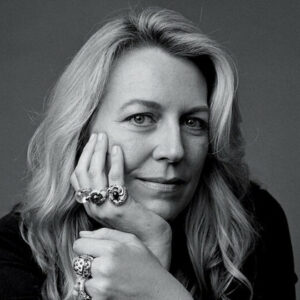Legally Literary: A Reading List of Lawyers (or Law Students) Turned Writers
Deepa Varadajan Recommends Elizabeth Strout, Mohsin Hamid, Daniyal Mueenuddin, and Many More
Over the past two decades, I’ve worked on fiction between the spaces of my various law related jobs. Law firm associate. Federal judicial clerk. Law professor (which, happily, I still am). My debut novel, Late Bloomers, was recently released by Random House, and I found myself thinking about the lawyers-turned-writers that have inspired me over the years.
During the many years I worked on my own novel, dreaming of publication, I’d always notice if an author mentioned a J.D. degree in their bio, filing it away as inspiration. I’d feel a tiny jolt and think that maybe I, too, could someday join this club of lawyers (or former law students) who had published a book of fiction.
Now that my debut novel has been published, I’m often asked about my law background and why law-trained people are drawn to (and sometimes, quite good at) writing fiction. As I’m not inclined to make generalizations without supporting data (the academic life beats that trait out of you), I can only offer unsupported guesses. And here are a few.
Writers and lawyers pay careful attention to language. If you are a lawyer who drafts contracts, one wrong word or unartful phrase can have real consequences. Fiction writers, too, think hard about the words they choose. If you are a lawyer litigating cases, you likely write briefs and write them in ways designed to generate empathy for your client. Fiction writers, too, are in the empathy business. To empathize with another person, in circumstances different than one’s own, is why many of us write and read fiction.
Also, lawyers are in the constant company of hypotheticals: what if the facts of a case changed this way or that, what outcome then? In law school, professors pepper their students with hypotheticals (sometimes bordering on the bizarre). As a novelist, I’m engaged in a years-long hypothetical exercise; what if my characters did this or that, what then? And then, of course, there is this: The best legal writing can shine a light on inequity and remind us of our shared humanity. Great fiction often does that too.
(As I write these words in May, Asian American and Pacific Islander Heritage Month in the United States, what comes to mind are the dissenting opinions in Korematsu v. United States, 323 U.S. 214 (1944), rebuking the then Supreme Court majority’s decision to uphold racist orders excluding Japanese Americans from areas of the West Coast and relocating them to internment camps. As Justice Jackson wrote in his famous dissent: “Korematsu was born on our soil…. [He], however, has been convicted of an act not commonly a crime. It consists merely of being present in the state whereof he is a citizen, near the place where was born, and where all his life he has lived.”)
Again, these are just some guesses for why lawyers are drawn to writing fiction. But as I look back on the authors whose work has inspired me over the years, it is hard not to be struck by how many of them were lawyers for a time—or, at least, went to law school, even if they didn’t practice law. Here are nine novels and short story collections by former lawyers or law students that have inspired me along the way.
*

Elizabeth Strout, Olive Kitteridge
Elizabeth Strout received a J.D. from Syracuse University College of Law and worked briefly as a legal services lawyer. In a Fresh Air interview with Terry Gross, Strout described herself as a “bad lawyer” (I don’t believe that) but said that her law school training was nonetheless beneficial to her writing because “it stripped away the excessive emotion.”
Strout is one of my favorite writers, and I love all her story collections and novels, including her most recent, Lucy by the Sea. But Olive Kitteridge has a special place in my heart, and I re-read it often. Winner of the 2009 Pulitzer Prize, Olive Kitteridge is a deeply insightful and moving collection of thirteen linked stories that follow Olive, a retired schoolteacher, and other residents of Crosby, Maine, as they grapple with love, loss, loneliness, marriage, parenting, and familial estrangement.

Min Jin Lee, Free Food for Millionaires
Min Jin Lee’s first novel, Free Food for Millionaires, introduces the unforgettable character of Casey Han, a Princeton-educated Korean-American woman raised in Queens, who struggles with debt, loneliness, heartache, ambition, and parental expectations in her post-grad twenties.
Lee studied law at Georgetown and worked as a corporate lawyer in New York for a few years before leaving to focus on her writing. In numerous interviews, she has described the grueling billable hours of her law firm job and the health concerns that drove her to quit. Despite having experienced the unrealistic demands of New York law firm life firsthand, I’m almost grateful for its unpleasantness—if for no other reason than it prompted Lee to devote herself to writing her incredible novels and sharing her astonishing talent with the world.

Ben Fountain, Brief Encounters with Che Guevara
After graduating from Duke Law School, Ben Fountain practiced real-estate law at a large Dallas law firm for five years before deciding to pursue fiction writing full-time. Fountain discusses his law background in a New Yorker article by Malcolm Gladwell titled “Late Bloomers” (not the reason I picked my own novel’s title, I promise). In it, Fountain describes the challenges of writing fiction at night after working law firm hours and the eighteen long years that passed between his decision to quit law and the publication of his first book, Brief Encounters with Che Guevara, which won the Pen/Hemingway Award.
The stories in this terrific collection, set in locations as varied as Haiti, Columbia, Myanmar and Sierra Leone, are heartbreaking, surprising, complex, and darkly funny.

Charles Yu, Interior Chinatown
Interior Chinatown, Charles Yu’s second novel, won the 2020 National Book Award for Fiction. Stylistically inventive, moving, humorous, and fiercely intelligent, Interior Chinatown tells the story of Willis Wu, an actor who dreams of being cast as something other than the “Generic Asian Man.” I remember watching Yu’s virtual National Book Award acceptance speech during the pandemic (a time when I was revising my novel and wondering if I’d ever reach the finish line), and feeling such admiration for this remarkable author who had honed his writing skills while simultaneously pursuing a legal career for many years.
After graduating from Columbia Law School, Yu worked as a corporate attorney and in-house legal counsel for thirteen years before leaving law practice to write full-time. For years, he published fiction while working as a lawyer, carving out time to write despite the intense demands of a legal career.

Mohsin Hamid, Moth Smoke
Mohsin Hamid graduated from Harvard Law School and worked for several years as a management consultant at McKinsey & Company. His first novel, Moth Smoke, grew out of a third-year paper he wrote during law school for a Law and Literature seminar. The visceral, first-person narration of Daru Shezad, as he recounts his tragic love affair with his best friend’s wife and his drug-fueled descent from working as an unfulfilled bank employee in Lahore to standing trial (unfairly) for homicide, stayed with me long after finishing the book.
Honestly, it is too hard to choose just one Mohsin Hamid novel for this list. I’m a fan of them all: The Reluctant Fundamentalist, How to Get Filthy Rich in Rising Asia, Exit West, and his most recent, The Last White Man. But being a law professor, I have a particular fondness for the origin story of Moth Smoke.

Margaret Wilkerson Sexton, On the Rooftop
In Margaret Wilkerson Sexton’s third novel, On the Rooftop, a mother’s dreams of stardom for her musically gifted daughters in 1950s San Francisco conflict with their own passions and limitations. I loved this tale of complicated family dynamics, artistic ambition, parental expectation, sibling rivalry, displacement and eminent domain.
I was hooked from the first page and could not put the novel down until I finished. Sexton has a J.D. from UC Berkeley School of Law and worked at a law firm for two years before leaving to focus on her writing.

Adam Haslett, You Are Not a Stranger Here
Adam Haslett did not practice law, but he graduated from Yale Law School. His novels, Union Atlantic and Imagine Me Gone, have been published to great acclaim. His first book, the story collection You Are Not a Stranger Here, was a finalist for the National Book Award and Pulitzer Prize. It was published when Haslett was a law student at Yale. In fact, I was a law student there at the same time (though we did not know each other).
I first read this collection when I was a third-year law student, and it completely blew me away. Even now, I recall how astounded and inspired I was by the knowledge that someone who wandered the same halls and sat in the same classrooms as I did at that time could be such an extraordinarily gifted writer. The characters in this collection confront loneliness, longing, mental illness, and grief, and their stories are told with remarkable compassion and insight.

Daniyal Mueenuddin, In Other Rooms, Other Wonders
Daniyal Mueenuddin’s story collection, In Other Rooms, Other Wonders, was also a finalist for the National Book Award and Pulitzer Prize. Tragic, gripping, and beautifully written, these linked stories follow members of the wealthy, landowning Harouni family, and the servants and staff that tend to them.
As Mueenuddin has described, his own experiences running his family’s farm in Pakistan in the years before he attended Yale Law School inspired many of the stories in this collection. After graduating from law school, he worked briefly as a corporate lawyer in New York before leaving to pursue a writing career.

Jane Pek, The Verifiers
Jane Pek is a graduate of New York University Law School and works as a lawyer at a global investment company. She might be the only author on this list who still practices law alongside her writing career. Combining literary mystery with immigrant family tension, Pek’s riveting debut novel, The Verifiers, is witty, suspenseful and defies easy categorization.
I rooted for Claudia Lin, amateur sleuth and compulsive re-reader of Pride and Prejudice, as she navigated secrets, lies, parental disappointment, love and privacy in the algorithmic age.
______________________________

Late Bloomers by Deepa Varadarajan is available via Random House.




















